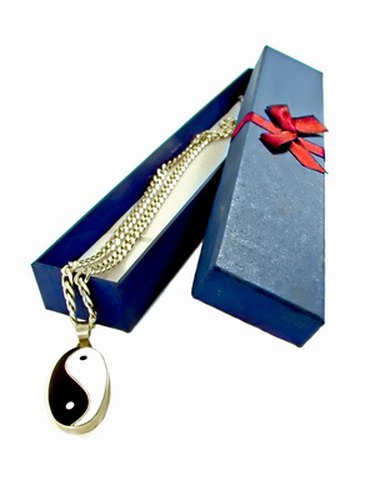
In ancient Siam, albino elephants were holy symbols of prosperity, but a white elephant gift would make you a pauper. Only the king had the money to care for albino elephants. When he was mad at a rival, the king presented him with a white elephant, knowing the upkeep cost would ruin him. Today, Americans and Canadians unload their own white elephants, gifts with limited use, in an exchange game. Try this economical gift swap with your family, religious organization or co-workers.
Invitations
Video of the Day

Send invitations announcing the white elephant exchange as an activity at the event or party. Tell guests to bring gifts they have previously received but cannot use. The invitation should set the tone for the exchange--irreverent gags or tame re-gifts. Set a price range for the gifts, usually $5 to $20. Tell guests to bring their items wrapped or in a gift bag with no name attached.
Video of the Day
Setup
Designate a location for guests to place gifts as they arrive at the party. On small slips of paper, write a number for each person at the party. Place the numbered slips of paper in a container. Once everyone has arrived, ask the guests to gather around the gifts. Pass the container around the group, asking each person to draw one number. The numbers they draw determine their order in the exchange.
Taking Turns
The guest who drew number 1 goes first. He or she chooses any wrapped gift from the pile and opens it in front of everyone. Guest 2 chooses either to steal the first gift or unwrap a new gift. If she steals the first gift, Guest 1 must unwrap a new gift. Continue in order until every guest has either unwrapped a new gift or stolen someone else's item. The last person to play the round has the option of stealing any of the opened gifts or unwrapping the final gift.
Stealing Gifts
A gift may not be stolen back from the guest who just took it, nor be stolen more than once each turn. The turn ends when a guest chooses to open an unwrapped gift instead of stealing a previous item. If during Guest 3's turn, she steals a candle from Guest 2, who then steals Guest 1's picture frame, Guest 1 must open a new gift. He cannot steal the candle because it was already stolen this turn, and he cannot steal the frame because it was just taken from him. When a gift is stolen for the third time during the game, it cannot be stolen anymore. That gift officially belongs to the third owner.
Guest 1
When the final turn has ended and all the gifts are unwrapped, Guest 1 gets one more chance to steal a gift. He may choose to keep the item he has, or put it back in the middle. He then chooses any gift, except those items already swapped three times. If he steals a gift, that guest continues the final turn by choosing the gift in the center or stealing from another guest. The final turn ends when a guest chooses the gift in the center and every guest has an item.
Variations
Groups larger than 30 can split into smaller exchanges of 10 people to save time. Let the guests pile all the gifts together, then randomly place 10 wrapped gifts on different tables. Split guests among assigned tables, and assign each a number 1 to 10. When each sub-group has completed its final turn, allow the Guest 1 from each table to steal from any other table.
For another variation, keep all the gifts wrapped until the final turn. Guests will guess, based on the weight and packaging of each item, but no one knows until they unwrap at the end. You can also set a theme for the types of gifts. Ask guests to bring cooking utensils, used CDs, or their tackiest wedding presents.
Annual white elephant exchange parties often have a few gag gifts that are re-gifted each year. Start this tradition for your white elephant party by saving the funniest or most useless item to bring back next year.